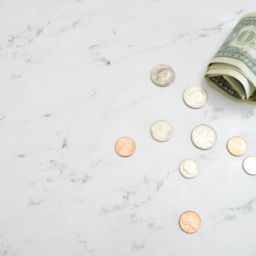
Aside from landing a job, I had one main goal after graduating from college: Pay off my student loans in under two years.
When I left Ball State University in May 2019, I had well over $40,000 in student loan debt. After talking with my peers and comparing our loans, I discovered my total was a little steeper than theirs. According to Education Data, the average federal student loan debt is $36,510 per borrower. Typically, federal student loans from the U.S. Department of Education follow a standard repayment term of 10 years, but in some situations, it can take up to 30 years, depending on the type of loan. NerdWallet estimates that 42.9 million Americans have federal student loans. To put it into perspective, that’s roughly one in eight people.
As I sat down and calculated how much I’d have to pay per month to achieve my goal, I wasn’t at all convinced I’d be able to make it happen, especially since I graduated with a journalism degree, which happens to be one of the lowest paying college majors according to Investopedia. And on top of that, I worked as an intern for six months after graduation, which was the farthest thing from lucrative. It started to feel as if the only way to pay off my student loans was with a six-figure, entry-level job—basically, an employment unicorn.
When graduation rolled around, I decided I didn’t want my student loan debt to stand in the way of any future decisions, such as buying a house or enrolling in graduate school. After a lot of research, I decided to use Dave Ramsey’s budgeting tips, like how to determine budget percentages and pay off loans with the Debt Snowball. I also learned more practical money-saving tips from friends who graduated before me and how to save money while also paying off debt.
Spoiler alert: I ended up paying off my student loans in 16 months, a whole eight months earlier than my original target.
Here are seven ways I dug myself out of debt and saved money for my future goals, which might be easier than you’d think.
Don’t be afraid to move back home after graduation
One of the biggest reasons I was able to chisel off my student loan debt so fast is because I lived at home for two years following graduation. That meant I didn’t have rent to pay or a water and electric bill; rather, nearly all of my money was being thrown between my loan and savings account.
However, I wasn’t alone in my decision to move back home with my parents. TD Ameritrade estimates 50% of Millennials move back in with their parents after college according to a May 2019 study. That same study reports that nearly 30% of Millennials delay moving out of their parents’ home due to student loan debt, as well as other major life decisions such as buying a home or saving for retirement. In addition to being able to pay off debt, living at home for a few months is also an ideal way to save up money quickly and set yourself up for a better financial future.
Cut back on unnecessary spending
Once my student loan payments started in November 2019, six months after I graduated from college, I challenged myself to not buy any unnecessary clothes, makeup, or whatever new item caught my eye at Target. Thanks in part to prior internships, I had a decent amount of professional clothing already that was still in good shape, so I didn’t need to worry about buying a new office wardrobe. However, I didn’t want my coworkers to think I only owned two outfits, so the sales racks and coupons became my best friends. If you absolutely need new clothes and don’t want to spend any money, try participating in a clothing swap with friends or shop for major discounts at the end of the season. When in doubt, hit the thrift stores and resale shops.
Track your spending
It’s important to see where all your money is going and how it can be allocated elsewhere if needed. According to The Penny Hoarder, a little over 50% of Americans don’t use a budget, while 56% reported not knowing how much money they spent in the last month. Seeing where your paycheck is going helps ensure you’re living within your means. Once you start tracking your spending and seeing where most of your paycheck is going, it’s easy to see where you can cut back in one area and spend more in another, i.e. paying off your debt.
RELATED: YOUR GUIDE TO GETTING YOUR MONEY IN ORDER
Keep the eating out to a minimum
It turns out my mom was right all those years: There really is food at home. When I started tracking my spending, I noticed one of my biggest expenses was eating out with friends or grabbing lunch on my way home from an in-person meeting. When November rolled around, and I had to start my student loan payments, I budgeted $50 a month for eating out, which also included a 20% tip if I went to a sit-down restaurant. That meant I’d have to cut back on my Starbucks runs or eating out with friends. An easy way to still have good conversations over a meal without spending a lot of money is doing it virtually. Plus, it’s both COVID-19 and budget-friendly.
Have multiple streams of income
Even before I graduated from college, I had multiple sources of income, thanks to freelancing and working part-time on-campus. This can also look like working nights or weekends at a store or restaurant, taking surveys, or becoming a virtual assistant. With these added revenue sources, it’s important to make sure you’re putting as much of it on your loans as possible because the faster you pay it off, the less interest you’ll have to pay, depending on the perimeters of your loan, of course.
Invest in a bike instead of a car, if you can
While I was in college, I lived in downtown Indianapolis during the summer while I interned. Instead of buying a car, and thus paying for a vehicle, gas, and car insurance, I bought a bike and a helmet for $100. Biking to work saved me thousands of dollars in the long run (and also time because I wasn’t stuck in traffic). It took me a whopping seven minutes to get to work on any given day. And if you’re within walking distance but can’t afford a bike, walk instead! It’s completely free and environmentally friendly, and a great way to get in some exercise.
Live below your means
One of the best ways to save extra money so you can put it toward debt is to live below your means. This means spending less than you make. It might look like renting a cheaper apartment or bringing in roommates to help with rent and can even be cutting back on your grocery budget or getting rid of a streaming service. Then, all that extra money can be put toward your savings accounts or any debts you might have.
All of our content—including this article—is completely free. However, we’d love if you would please consider supporting our journalism with an Indy Maven membership.

















